Meet the married couple behind Suitcase Records, Australia’s newest vinyl record press
For his 50th birthday, Neil Wilson gathered a few dozen friends and relatives at his family home. His costume change – revealing his new career move – caught everyone by surprise.
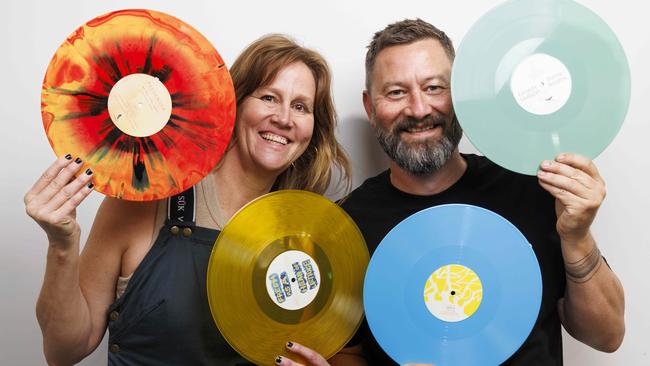
To celebrate his 50th birthday, Neil Wilson gathered a few dozen friends and relatives at the family home in Brisbane’s inner north. He prepared Mexican food for a midweek dinner, and as the group milled near the kitchen and the back deck, he gave a speech of thanks that reached far into his past and looked toward the future.
It was October 2021, and by most measures of social status, he appeared to be midway through a successful life, as he and his wife Kathy had carved out well-paid corporate careers while raising three children.
In recent years, though, the architect and project manager had been unable to shake the feeling that something was missing.
Like a rip-tide flowing beneath the break at an otherwise serene ocean scene, he felt a strong tug.
It urged him to try something different. Something creative. Something independent. Something completely unexpected.
Which is why, on his birthday, Neil led his audience on an impromptu tour of his first five decades, while referring to several of his guests as mile markers on the journey so far. The speech was premeditated but unwritten, as he broke through his usual allergy to public self-reflection.
“I don’t like talking about myself generally, because I feel it can be self-indulgent, like blowing your own trumpet,” he tells Review.
“But I found that a really cathartic speech to make, because it was all building to, ‘And this is what we’re doing now …’ ”
His final words, as he looked to 2022 and beyond, were a closely guarded secret. Very few in the room knew what was coming next. It involved a surprise costume change, as, with a dramatic flourish, he removed his top to reveal a T-shirt worn beneath that displayed two words: Suitcase Records.
“It was just that classic thing,” Wilson says. “I was approaching 50 – a great time for a middle-aged, middle-class white guy to have an existential crisis. But I didn’t buy the red Porsche, and I didn’t run away with the secretary – I bought a record press.”
Although there’s nothing out the front advertising Australia’s third and newest vinyl pressing plant, which is situated in an industrial zone near Brisbane Airport, the first thing you see on entering the building is a brightly lit sign with the company logo.
Nearby it sits a collection of records on a shelf, with cover artwork proudly facing outward. In the next room lies an impressive, imported machine on which Neil and Kathy Wilson have hitched their dreams.
The eye-catching bit of kit is called an Allegro II, a fully automatic vinyl record press that was designed and manufactured in a joint venture between MCS Sironi of Italy – led by Franco Sironi, who ran production for EMI Europe for more than 20 years – and Hong Kong company M-Tech Engineering.
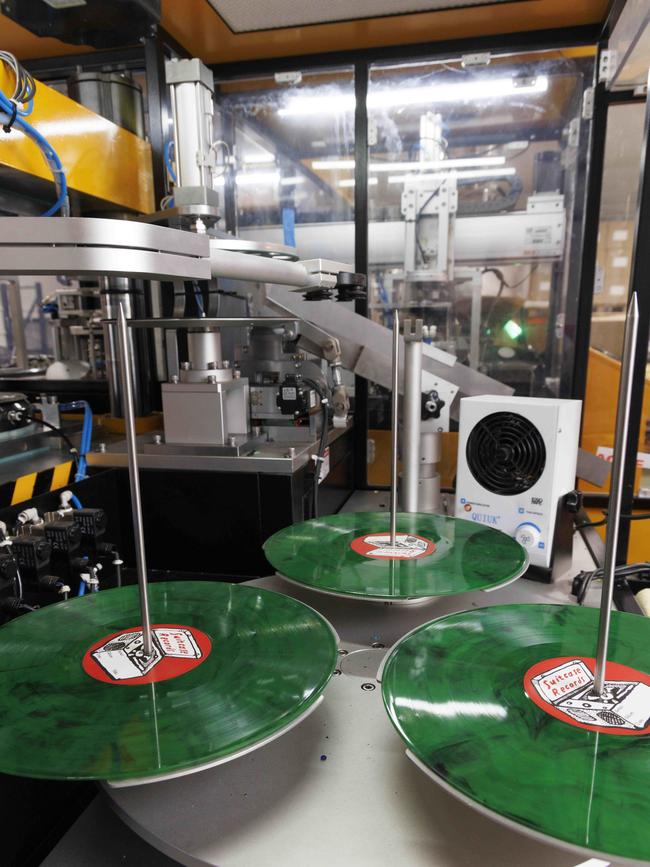
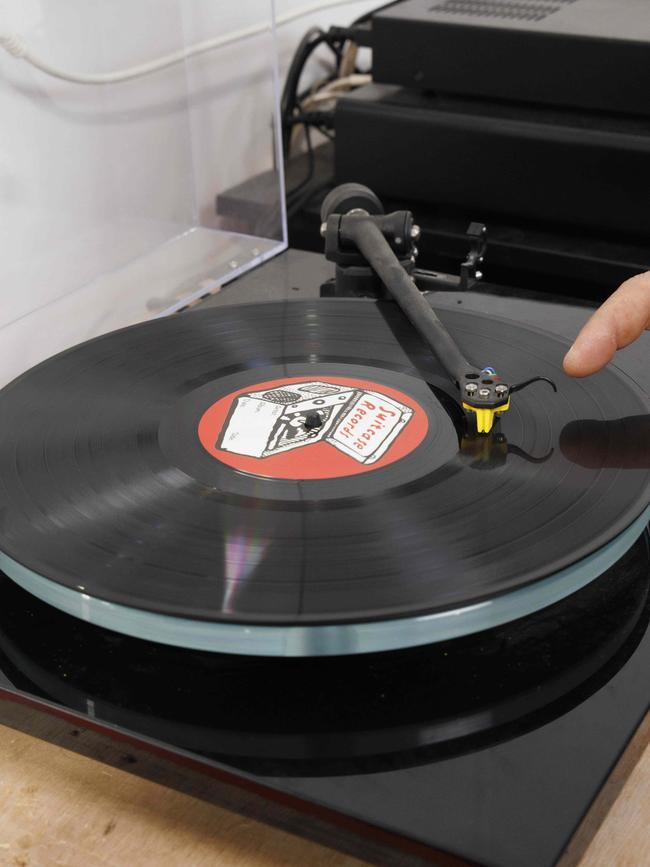
The Allegro II is a top-of-the-line press capable of producing a finished 12-inch record every 28 seconds. It is a wonder of modern engineering, and getting it here to the suburb of Pinkenba involved a giant leap of faith – albeit a calculated one – and a decent chunk of cash.
“We sent off a 70 per cent deposit, which was about $200,000,” says Neil, 52. “We were wondering whether Franco is going to be driving away in Italy somewhere with his new Maserati – but luckily, Franco is a very lovely guy who didn’t do that. All up, with equipment and set up costs, we didn’t get much change out of half a million [dollars].”
Since the yellow-and-black unit was installed on the factory floor in mid-2022 it has pressed about 85,000 records for artists including Savage Garden, Tina Arena, Busby Marou, The Wiggles, Dan Sultan and G Flip. The couple has produced high quality products for record labels from the three majors – Universal, Sony and Warner – all the way down to smaller indie labels and unsigned acts.
When Review visits in the first week of January, the pair has just begun work on its 215th vinyl project since Suitcase opened for business 16 months ago and is gearing up for what it hopes will be a bumper year in the vinyl business.
Judging by recent trends, the timing of Suitcase’s market entry appears to be excellent.
In the past decade, the national vinyl album market has ballooned from a mere $2.9m in 2013 to $35.4m in 2022, according to the most recent data supplied by the Australian Recording Industry Association (ARIA). (These figures are indicative, not a whole-of-industry census, as not all sales are reported to ARIA by members or retailers.)
The peak body does not publish weekly album sales data, but confidential industry reports seen by Review indicate that an average of between 20,000 and 25,000 vinyl albums are sold nationally each week.
For the most recent chart week ending January 4, for instance, ARIA recorded 23,769 total vinyl sales. The highest seller was Taylor Swift’s 1989 (Taylor’s Version), which sold 625 copies.
The US pop singer-songwriter last week held the top four spots on the vinyl chart, as well as No.1 on the overall album chart with 1989 – thanks in part due to its physical sales, as ARIA’s weighted calculations place a much higher value on buying music, as opposed to the more common act of streaming it.
When compared with the prior year, the dollar value of vinyl album sales in 2022 jumped 22 per cent to $35.4m, despite retailers only selling a fraction more units (1.149m in 2022, up from 1.141m in 2021).
This surprising figure indicates that vinyl consumers have been willing to pay more for what’s now widely seen as a high-end, collectable totem of fandom in an era when most music is streamed, either for free (with ads) or for a monthly subscription fee.
Today, some vinyl buyers might never remove an album from its sleeve, let alone place it on a turntable and drop the needle.
For these fans, the choice to buy a favourite artist’s album is seen as an extension of their identity akin to wearing a music T-shirt, and you’ll often find these record covers displayed like trophies in homes or bedrooms.

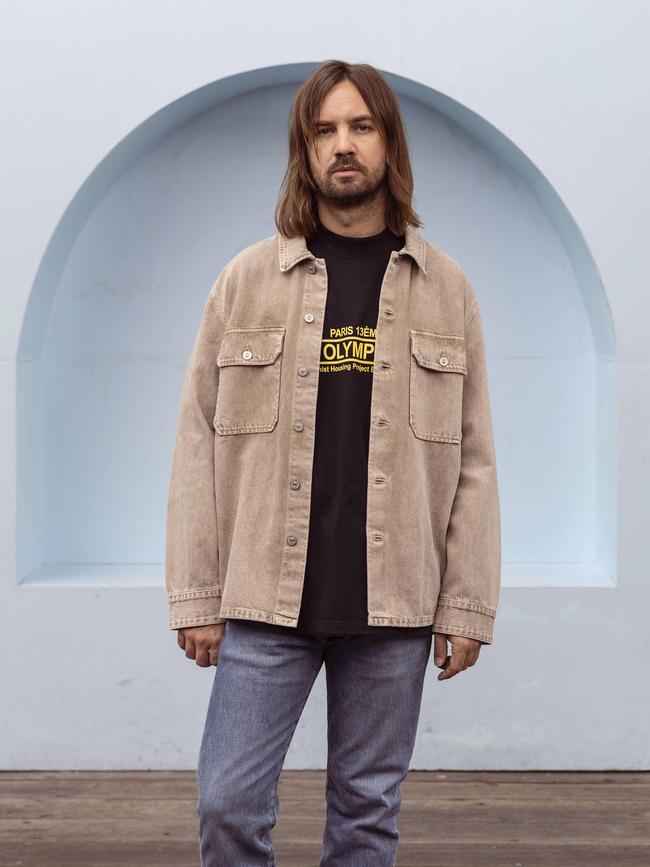
But plenty of younger listeners are approaching this older format with reverence, too, by seeing it as a way to more deeply engage with the artistic decisions made in the studio and immortalised in the grooves pressed into coloured PVC plastic.
“For a lot of kids getting into it, it’s an antidote to technology,” says Neil, as he sits in the Suitcase front office beside a stereo, turntable and impressive vinyl collection.
“It’s not just hitting play on Spotify and letting the algorithm do it. You have to make a cognitive choice, ‘What am I going to listen to?’, as you flick through your records – and if you want to stop playing, or change a song, you’ve got to physically get up and move the needle.
“A lot of people don’t do that, and so then it forces you to actually listen to the album in the way in which the artist intended it.”
Neil’s costume change at his 50th birthday caught nearly everybody by surprise. The decision to launch into an industry in which he had neither contacts nor prior knowledge was not one taken on a whim, but it did take a pandemic to nudge him in that direction.
“I was a Covid casualty; there were about 30 of us who were made redundant on the same day,” says Neil of his six-year role at multinational construction firm Lendlease, which ended in 2020.
“I got another job pretty quickly in a private project management consultancy, and that’s when I really realised, ‘This just ain’t me – I’ve got to do something different.’”
One day, he clicked on to a news article outlining the growing global demand for vinyl records. As a lifelong music fan – “But I’m not a total vinyl nerd,” he clarifies – this nugget caught his attention, but he didn’t make the connection to a potential business opportunity until a few weeks later, when he read another article about a couple of people in Cleveland, Ohio, who had taken on the risk of setting up a small plant with new pressing equipment, despite not coming from a manufacturing or music background.
He casually asked his wife for her thoughts on opening a vinyl record plant. “I remember saying, ‘How cool would that be?’ – in a purely hypothetical, ‘That’ll never happen …’ sort of way,” says Kathy, 52, with a laugh.
Neil took that response as a green light, and quietly worked up a feasibility study on its market potential to show to his wife.
At the time, she had spent 10 years as a corporate communications writer for companies such as Expedia and Travelocity, while managing a team of about 30 people. The plan was that she would keep that role, and Neil would manage and operate the vinyl plant.
As for funding this lark they called Suitcase Records – named after the luggage item in which artists tended to carry their vinyl to sell at gigs – the first thing they sold was their house.
“Our kids were growing up and leaving home, so our suburban (Brisbane) home in Ashgrove didn’t necessarily make sense anymore,” says Kathy.
When the proceeds from that sale weren’t enough, they settled on a private commercial loan, after finding few lenders would support their business case to establish the third active vinyl pressing plant in Australia, following Zenith Records and Program Records, both of which are based in Melbourne.
What followed was a steep learning curve for a record pressing process that Neil succinctly describes as “witchcraft”, and an “accelerated apprenticeship” that involved much late-night WhatsApp messaging with the manufacturer.
They learned the Allegro II can be a temperamental machine that wakes up in a “bad mood” some days, and requires constant checking to ensure only quality records leave the factory.
Frustrated, Neil sought conversations with scientific experts in plastics, who reassured him that the base material used in records – polyvinyl chloride, or PVC – is simply a “weird compound” that behaves differently depending on heat, colour, pressing duration and a host of factors no one fully understands.
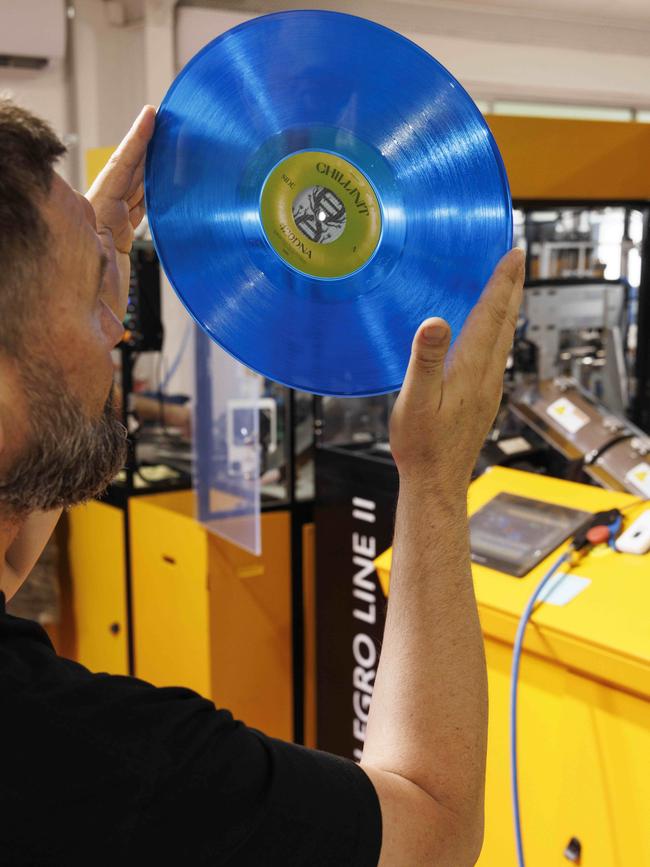
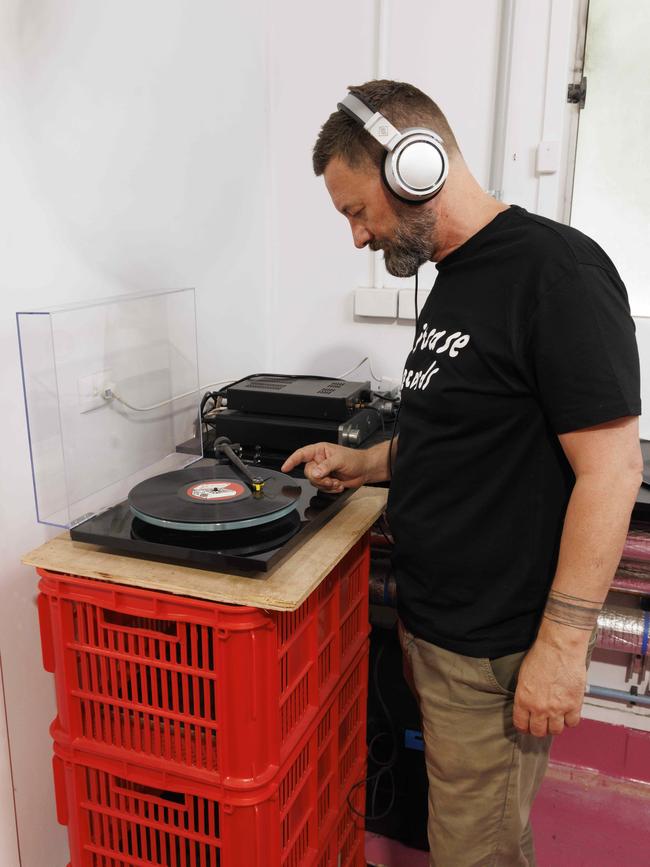
In other words: it’s a highly hands-on job, and Neil soon realised it wasn’t possible to manage the whole operation himself. Rather than recruiting someone to run the customer service side of things, and handle suppliers, he asked his wife, who quit her job to come on board as co-owner and co-director.
Sometimes, in the early days before they opened their doors to the Australian music community, those problems resulted in a body lying crumpled on the factory floor, on the brink of tears.
“We took it in turns,” says Kathy, smiling. “One of us usually managed to push through; we didn’t both fall in a heap at the same time, blessedly. There is a strength that gets built up when you keep beating problems. It’s like a muscle.”
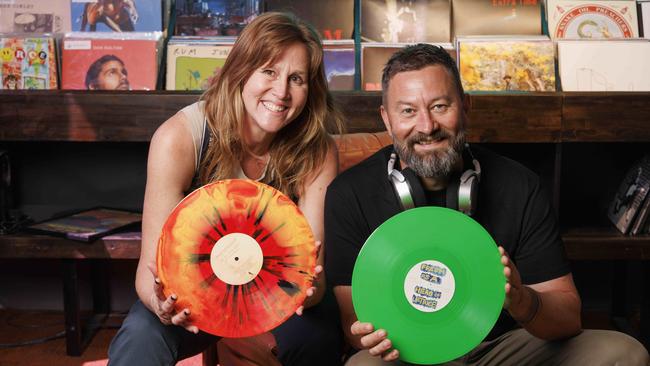
What has surprised them in the 16 months since their first pressing – evocatively titled Divorce, an EP by a Brisbane garage rock band called Girl and Girl – is the speed at which record labels from across the land have contacted them to discuss and book pressings, as word of their eight-week turnaround spread. Feasible? Certainly.
“There’s enough in the market in Australia for the three pressing plants now,” says Neil. “What we’re hoping – and we’ve seen indications it will start to happen – is for some of the bigger labels to start to onshore some of their manufacturing, whereas traditionally they’ve been going overseas for it. With the cost of shipping now, and the turnaround times, I think it’s becoming more sensible to press in Australia.”
Thinking back to Neil’s 50th, Kathy says, “I felt proud of the journey that we were on – and that’s what life’s about, right? Back then we were more full of excitement than terror; we should have had more terror in our hearts then. But we didn’t,” says Kathy with a laugh. “We thought it was going to be fine.”
During Review’s visit, there’s a knock on the front door: it’s a young musician who recently inquired about pressing 100 copies of an album by his indie folk duo.
Neil politely excuses himself to give a factory tour to this bright-eyed muso with a dream, including proudly showing off some of Suitcase Records’ finished products.
Judging by his age, this artist has likely never pressed his songs onto vinyl before — but that may be about to change.





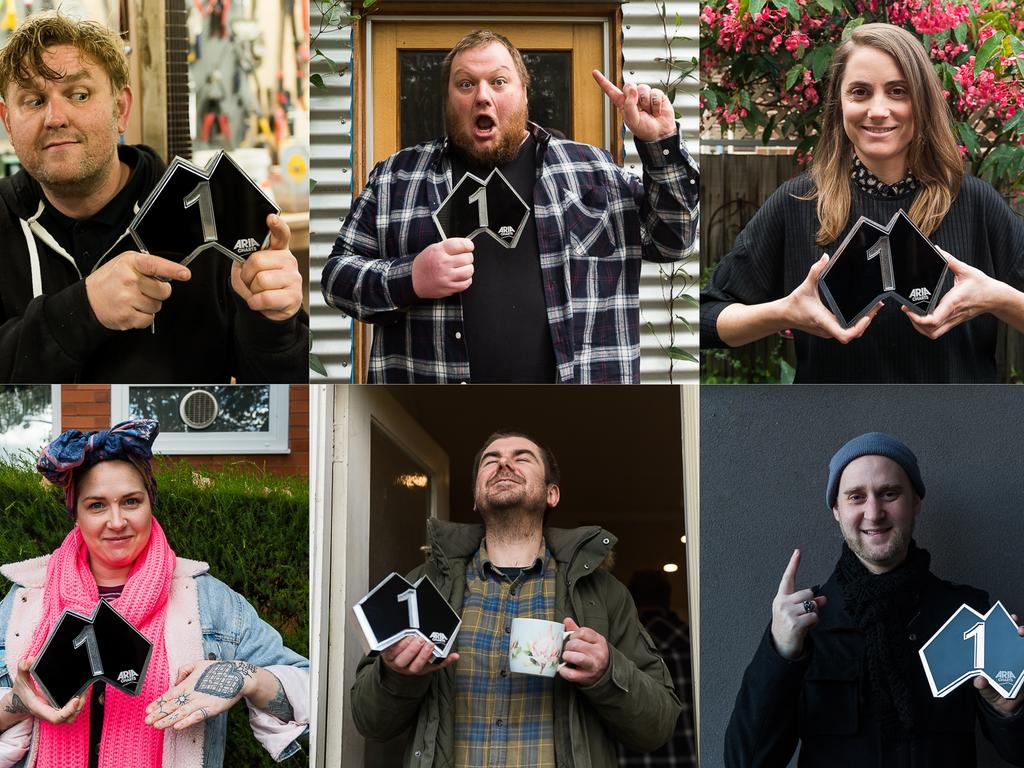
To join the conversation, please log in. Don't have an account? Register
Join the conversation, you are commenting as Logout